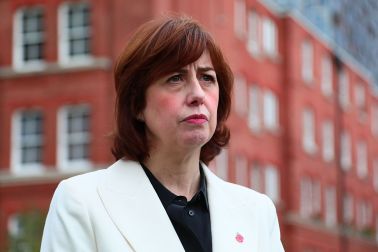It didn’t have to end this way.
In more than two decades of campaigning I never encountered a politician more personally unpopular than Sadiq Khan. Even Labour voters seem lacklustre in their support. Against a backdrop in London of rising knife crime, hollowed-out night life, unpopular driving charges, increasingly unaffordable homes, endless divisive protests and a failing police force, it was easy to understand why.
Sadiq Khan, seeking a third term, was beatable. That the Conservatives pulled defeat from this potential victory makes me, a former Conservative Member of the London Assembly and an activist for over two decades, both sad and angry. This was avoidable. Victory in London would have been a huge moment, giving pause for thought to those ready to count the Conservatives as dead and buried.
At one point, Judge Rinder’s name was being thrown around. This just wasted time
No longer a party member, I feel I have a duty to be candid and offer my inside view on the process, policy and campaign failures that led to this defeat. I’ve always been a bit of a nerd about London issues, policing, transport, housing and so on, and had always liked the idea of running for Mayor. I threw my hat into the ring, very quickly yanking it back out when I saw how this particular game would be played.
In fact, once the process was underway I had a moment of clarity about the direction of travel of the Conservative party in London and nationwide. I realised that politics no longer sparked joy and that there were other things I wanted to do with my life. That’s how I came to stand down from the Assembly last Friday.
Alarm bells sounded from the outset with the Mayoral candidate selection process. This began far later than hoped, itself an error. The small number of candidates who came forward were sifted into a longlist, to be further whittled down to a shortlist of three by a committee of party apparatchiks.
This is where things began to go badly wrong. The committee was a closed group of local activists with varying levels of political acumen. There was a fruitless, misguided search for candidates with vaguely-defined ‘name recognition’, which led the party down some strange cul-de-sacs: at one point, Judge Rinder’s name was being thrown around. This just wasted time.
All sorts of wheeling and dealing went on, with activists playing off different candidates and their teams against each other. Would-be campaign managers went from candidate to candidate hawking their wares, ambitious activists offered support to multiple camps in the hope of landing on the winning side, a message from my own supporters WhatsApp group was leaked to the press. Rather than engaging in a serious process to select a credible candidate for the capital’s mayoralty, it felt as if some were simply acting out their Machiavellian fantasies.
Despite these shenanigans, I was told numerous times by those who were there that the shortlist vote was based on the candidates’ performance in the interview room on the day. If true, this is frankly crazy. Looking back, it was a monumental strategic blunder not to shortlist MP Paul Scully, who I am told could have given a better interview on the day but who overall would have been an excellent candidate. The decision displayed a worrying short-sightedness.
In the end, the three shortlisted candidates were Mozammel Hossain, Daniel Korski and Susan Hall, the only one to have held elected office. Korski, who had no real political footprint, dropped out after historic allegations against him resurfaced. That left just Hossain, a likeable but utterly unknown lawyer with even less of a political footprint than Korski, and Susan Hall. CCHQ would not reopen the selection process. The result was a foregone conclusion.
I don’t ‘blame’ Susan Hall for this outcome. I like Susan and enjoyed working with her on the Assembly. She did what politicians do – she ran for something. It is not her fault that the mismanaged processes around the selection led a situation where members were bounced into a decision.
My views on the attributes of an effective candidate remain the same: they must be someone who can speak to the core vote while growing the electoral coalition just that bit wider. Someone with the ability to run a slightly different, eye-catching campaign. Someone with a bold offer for younger voters (read, under 50s) and the capacity to promote an optimistic vision for the city, while not letting Sadiq Khan get away with his mistakes.
Sadly, what emerged was a narrow and negative view of London from a campaign that appeared nervous to say anything that might frighten an ever-shrinking core vote. Hence the overuse of tired ‘war on motorists’ language and an outsized focus on Ulez and pay-per-mile driving which, while important issues, were never going to be enough to secure victory.
Too much was made of the 2023 Uxbridge and South Ruislip by-election victory, ascribed to a strong anti-Ulez campaign. The lesson should have been that the Conservatives barely clung on to a previously solid constituency. But groupthink prevailed and I believe this informed the Mayoral campaign far more than was healthy.
I am not alone in being disappointed with the campaign’s thin policy platform. While size isn’t everything, Hall’s manifesto was less than half the length of Shaun Bailey’s 2021 offer. It contained almost nothing for the younger, professional voters the party absolutely needs to win over. It contained almost nothing for renters either, said very little about the collapse of London’s night life and in fact stuck fairly closely to bureaucratic, GLA orthodoxy.
This narrow mindset was visible in the execution of the campaign itself too. Sadiq Khan’s unpopularity was correctly diagnosed, but the Conservative prescription – a highly negative campaign – was wrong. The result, again, was that the campaign spoke only to that dwindling core vote. Londoners love their city and it’s just plain bad politics to talk down something people consider so precious.
It wasn’t just the messaging. The campaign team was too ready to believe their own hype; I was told countless times how utterly convinced they were of victory. Confidence is essential, but it’s important, too, to stay grounded and listen to what voters, and the polls, are telling you and respond accordingly. The bizarre briefing on Friday before the votes were counted that Susan was actually going to win was symptomatic of this. Expectations management is important and it was disappointing that these rumours were allowed to spread.
In fairness, the campaign was hampered by the dire, declining state of the Conservative party in London. A dwindling activist base in much of the city means that the party can field only a fraction of the army that Labour enjoys.
I’m old-school: online campaigning is essential but you need that personal contact with voters. But in London the Conservatives simply do not have enough activists to make this a meaningful exercise. To Susan’s credit, her personal campaign schedule was full; she definitely put in a shift.
The result was never in doubt. A fumbled selection process, narrow and negative vision and lacklustre campaign meant that despite what some excitable local activists – and some who should have known better – said, Sadiq Khan was always on course for a third term. It is depressing.
For the Conservatives, the problem is wider than London. The kinds of voters the party failed to connect with in this campaign are precisely those it needs to reach across the country in order to prevent a nationwide extinction level event. I was saying this during my brief Mayoral bid last year, but few were prepared to listen.
I write this article, knowing it represents a personal burning of bridges, in the hope it will spark a much-needed debate about the Conservatives’ approach to London. CCHQ must conduct a full and honest appraisal of the campaign and start applying the lessons immediately. Sadly, I expect this will be lost in the imminent national deluge and that in 2028, they’ll be right back where they started.
It doesn’t have to end this way.
Listen to Katy Balls and James Heale analyse the local election results on the Coffee House Shots podcast:






Comments